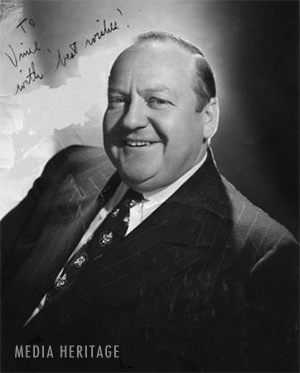Quiz 6 – Arthur Q Bryan
November 1, 2013

If you've just checked our blog, we're playing a game on our Facebook “Media Heritage, Inc.” and “Big Broadcast” pages. If you'd like to play, “like” one or both of those Facebook pages and on Mondays, we'll post a photo of an old radio “second banana”…a secondary or character actor from the 1930s through '50s. You'll be instructed to email a guess as to the identity to our email and from the correct answers, we'll pick a winner for a prize each week on Wednesday night! Then check back here at the blog, later in the week, for the answer.
If you're a fan of classic radio or if you've watched those classic Warner Brothers cartoons, you'll certainly recognize the voice of Arthur Q. Bryan. Bryan was born (in 1899) and raised in New York City where he struggled to find steady work as an actor, so he moved to Hollywood in the early 1930s. But his career didn't exactly take off there, either, until the late 1930s when he was hired by Warner Brothers' animator Leon Schlesinger to voice the new character, “Egghead.” In time, “Egghead” evolved into “Elmer Fudd” and became one of the primary adversaries of “Bugs Bunny” on the screen. Bryan cleverly gave Fudd a speech impediment, pronouncing his “r's” as “w's” and was forever trying to catch that “wascally wabbit!” As the popularity of that voice spread, Bryan was soon called upon to pick up “second banana” radio jobs, most notably on Burns and Allen in the 1942 season, where Fudd's voice was heard regularly in a series of minor roles. Soon-after, Bryan landed a regular role on Fibber McGee and Molly as “Doc Gamble” and on Fibber's spinoff, The Great Gildersleeve, where he played “Floyd, the barber”—one of Gildy's friends in the social group, “The Jolly Boys.” Those characters sounded more like Bryan's regular voice. It's no coincidence that the barber character on TV's The Andy Griffith Show was also named Floyd, because the real life Bryant was very popular and much adored among Hollywood people. He was also somewhat obese, and it was poor health that led to a fatal heart attack in 1959. Before he died, Bryant had started to appear in early television and in some B-movies, but almost always as a character actor and not a headliner. Fortunately, his voice lives on in cartoons and classic radio recordings.
Read similar stories: Quiz, Radio, Television , Burns and Allen, Fibber McGee and Molly, Great Gildersleeve, Looney Tunes
